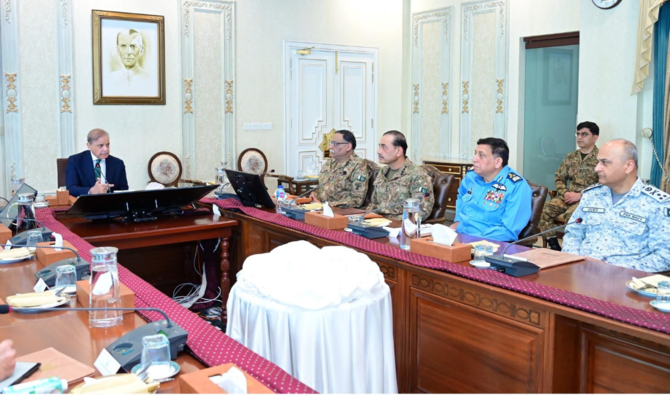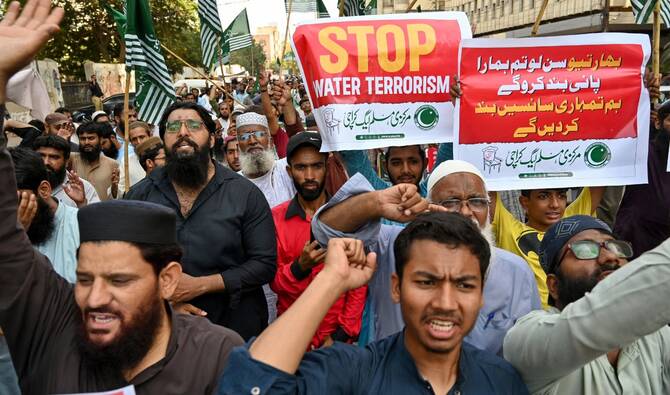LAHORE: Shahbaz Gill, 40, first heard about coronavirus through a public service message on a local news channel. “I know that is a dangerous disease,” he tells Arab News, “but I am not too sure about the precautions. I mean I do know, but just a little bit.”
Gill, who is a daily wager, lives with a dozen people in a 60-square yard home in a slum in Lahore, Punjab. “I know that we have to wash our hands at least 20 seconds if we don’t want to get sick,” he said. “Also, we must thoroughly cook all food items, especially meat and eggs.”
He received the last bit of information from one of his friends.
A father of two, Gill earns Rs 20,000 per month by painting homes. He has no savings or a bank account. The day he does not get work, running the household becomes difficult. Gill wants to buy hand sanitizers and face masks for his children but does not have the money. “Why wouldn’t I want to buy it? No one wants to die,” he adds. “But our [household] expenses are such that we cannot afford these things.”
Pakistan detected its first two cases of coronavirus on February 26. Since then the number of confirmed cases has jumped to 304, as of March 19. Two people have also died after being infected.
Earlier this month, the Ministry of National Health Services, Regulations and Coordination put together a national action plan on coronavirus. It identified, among other things, the need for “effective community engagement and awareness raising” through print, social and electronic media to combat the virus. “All parliamentarians are requested to actively spearhead the awareness campaign in their respective constituencies,” it reads.
Yet, Sonia Naveed, who works at a beauty salon in Lahore, is unclear about the measures needed to protect herself. “I read in a newspaper that we have to be careful of germs,” she told Arab News over the phone. “We must wash our clothes with Dettol and empty out the dustbin regularly.”
She has not received any government flyers regarding the virus. Neither has any government official visited her home. But after watching news, the 22-year-old and her family decided to stay home and avoid crowds. Others in her neighborhood, however, are not taking the spread of the disease seriously. Only half the people in her area have barricaded themselves. “The rest insist that ‘jo hoga dheka jaye ga’ (Whatever happens, will happen),” she said.
As per the guidelines of the World Health Organization, people are advised to regularly wash their hands and use sanitizers, maintain a social distance and avoid touching their eyes, nose and mouth. If a person has fever, cough and difficulty breathing, he/she should seek medical attention, it recommends.
However, the directives listed on an official pamphlet of the Punjab government further add to the standard precautions. One leaflet insists that people use online services to buy groceries and keep a minimum distance of one meter at home from family members. Both advises are impracticable for daily wagers like Gill, who live in large families and have little access to the Internet.
In light of the pandemic, officials at the national health ministry insist that they have launched a country-wide public information campaign about coronavirus. “Our message is loud and clear,” Dr. Tanveer Ahmed Qureshi, the secretary at the ministry, told Arab News over the phone. “The government campaign started in February and till now we have done everything in terms of awareness.”
Part of the strategy, the secretary added, includes distributing pamphlets and running advertisements on television and radio. Furthermore, telecommunication networks have been requested to forward awareness messages on people’s phones. “The prime minister is taking a lot of interest to ensure that we contain this virus and reverse it.”
Even then, Shakeel Bashir, who lives in Peshawar, is unsure about what causes the virus. “I don’t know. I think if you sneeze on someone they can get it,” he said.
Shahzeb, a laborer, is just as uncertain. He told Arab News he has not heard of coronavirus. “Someone said there is a virus that has come from China,” he said sitting outside a construction site on the outskirts of Peshawar, “I don’t know how you get it or what happens after you get it.”
Further complicating the government’s job is the flurry of misinformation on WhatsApp and other social media groups. A young man who works at a media house in Lahore says he does not use hand sanitizers. “There is alcohol in them,” he insisted, asking not to be named. “You can’t pray if you use a sanitizer. That’s what I read on WhatsApp.”
In order to deal with misinformation, said Ajmal Khan Wazir, the adviser to the chief minister of Khyber Pakhtunkhwa on information, the government is reaching out to religious clerics for assistance.
“Tomorrow I am meeting the ulema to help us with our awareness campaign,” he told Arab News. “We are doing whatever we can.”
Additional reporting by Natasha Zai





















